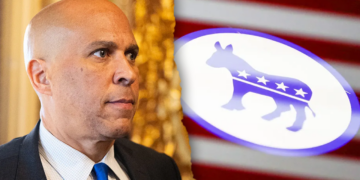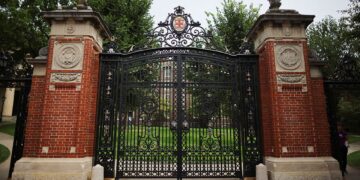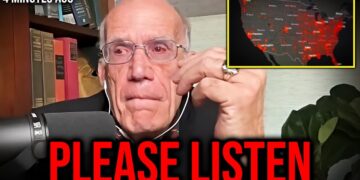It has been a week since the Continentals took on the British army at the New Jersey crossroads of Monmouth Courthouse. It was one of the hottest days of the war, and the Americans, fresh from a winter’s worth of training at Valley Forge, stood up to the full force of the British. >> Fire!
[gunshots] >> narrator: More than 20,000 soldiers clashed on the field. The battle raged for hours in the stifling afternoon heat, but the Continentals held their ground. >> Fire! [gunshots] Fire! [gunshots] >> Washington knew and the country knew that this new army was a good one. They had held their own against the British.This renews the public’s spirit for the war and solidifies Washington’s position as the unquestioned commander in chief. >> narrator: After the battle, the British withdraw to their stronghold in New York City, giving Washington hope for a brighter future in the war. The British pullout means the rebel capital, Philadelphia,
Has returned to American hands, and in the main chamber of Independence Hall, the Continental Congress is back in session. Across town at City Tavern, a crowd is gathering for an Independence Day celebration. The July 4th celebration is a who’s who of Philadelphia’s high society. Congressmen, statesmen, and wealthy merchants are all in attendance.
Also at the gathering is one of the most revered generals of the Revolution, the man personally installed by George Washington as Philadelphia’s military governor, Benedict Arnold. Arnold was born into a prominent Connecticut family, but his alcoholic father squandered the family’s fortune. Determined to overcome his lowly circumstances, he has become
A celebrated war hero through sheer will. In 1775, Arnold helped lead a daring mission to snatch the remote outpost Fort Ticonderoga from the British, but the credit for the victory went to the bold frontiersman Ethan Allen, a cruel blow to Arnold’s honor. Two years later, it was Benedict Arnold who
Rallied the Americans to victory in the battle of Saratoga, but at a high price. [gunshots] Arnold took a bullet to the leg and barely survived being crushed by his horse. >> When the battle was over, his second-in-command said, “Sir, where are you hit?” And Arnold said, “It’s my leg.
I wish it had been my heart.” And I do too. I wish it had been his heart, because if he had died at that moment, he would have been the great hero of the Revolution. >> narrator: Adding insult to injury–literally–credit for the victory went to Horatio Gates, the leader of America’s northern army.
It is another in a growing list of slights against Arnold. >> Gates doesn’t mention Arnold in his dispatches and garners all the glory for himself. The people and the press hail Gates as a new American hero. In fact, the hero of the battle was Benedict Arnold. >> narrator: Now, crippled by
The injury from Saratoga, Arnold has had to relinquish his battlefield command for a new charge from George Washington: to restore order to Philadelphia, a city still reeling from the eight-month occupation by the British. >> Philadelphia under the British was a place of terrible suffering for the poor who
Couldn’t afford to buy any food or fuel. It was a place where dozens of American prisoners of war died every day. The houses were in shambles. There was nothing to eat. There were people begging in the streets. >> narrator: The British occupation has helped radicalize the city. Mobs take to the streets for
Public demonstrations, where prostitutes dressed as Loyalists are paraded around town, a display of hatred towards any who sympathize with the British. And in heated backroom debates, both the state and Continental governments are seeking to reassert their political power over Philadelphia. It creates a precarious situation, one that the headstrong general
Is ill-equipped to handle. >> Benedict Arnold has something of a prickly personality. He is not the kind of person that an acquaintance would probably go out of the way to compliment to other people. He is vain, he’s somewhat self-serving, he’s somewhat self-interesting, and those that don’t already
Like him are not inclined to do him any favors. >> narrator: In addition, with his haughty manner and fancy dress, Arnold looks to many just like a Tory, a Loyalist. Around town, Arnold and his expensively dressed friends wear the wigs and fineries associated with the British, but it is Arnold’s actions as military
Governor that cause a stir. >> Arnold’s first act was to close all the stores, he said, to take an inventory of what there was available to supply the army and the civilians, but immediately the accusations began to fly that he was cornering the market on goods that he was going to sell himself.
I don’t think Benedict Arnold was doing anything as a commanding officer in Philadelphia that many of the other generals on both sides did as a matter of custom. Officers got a percentage, commissary generals got a commission, and he was only doing what others did. >> narrator: Arnold does little
To help his cause by regularly entertaining suspected Loyalists. There is one in particular who catches his eye, a younger lady, demure, quiet, intense, lovelier than the rest: Peggy Shippen. At 18, Peggy is half Arnold’s age and is the daughter of one of the wealthiest men in Philadelphia, the judge and merchant Edward Shippen.
The Shippens tried to maintain their neutrality under the British occupation but are strongly suspected of being Loyalists. Like many of Philadelphia’s society women, Peggy kept company with British officers over the winter of 1778. One of her closest companions was British general Clinton’s ambitious aide-de-camp, a young man by the name
Of Major John Andre. Shippen’s friendship with Andre has not ended with the withdrawal from Philadelphia. Through her friends, she still hears from the British officer. It is a relationship that ties her dangerously close to the enemy. Arnold is taken with the young Shippen and begins an intense courtship that captures her
Heart and culminates with their marriage. >> Peggy Shippen, from the time she was about five, had heard about Benedict Arnold. The newspapers were always full of his exploits. She was a gorgeous young woman. She was extremely well educated by her father, self-educated as well, could run a business, which appealed to a Yankee
Merchant like Arnold. Today they would be considered a dynamite couple, and I think they saw themselves in that term right away. >> narrator: But they are also a couple under scrutiny. For his extravagant parties and questionable business dealings, Arnold comes under fire in the press. They are deadly serious charges–corruption, abuse of
Power–leveled by an anonymous source. Once again, Arnold faces a slight against his honor, but this time, his integrity is called into question. It is an attack that may push him too far. >> narrator: Summer 1778: The Continental Army has proven its mettle at the Battle of Monmouth, a battle that has
Solidified George Washington’s position as the American commander in chief. [horse whinnies] The British have withdrawn to New York City, and the colonial capital, Philadelphia, is back in American hands. Washington entrusts the city to one of his most celebrated generals, Benedict Arnold, who is now the military governor. Meanwhile, across the ocean
In Paris, another celebrated patriot is anxiously awaiting news from the colonies. Benjamin Franklin, America’s great statesman and emissary to France, is expecting word on the arrival of the French fleet in America. The internationally renowned scientist and statesman has been heartily enjoying the fine wine and refined women of France
For the past year and has used his patient diplomacy to convince this great superpower and enemy of the British to join the American side of the war. Now 12 ships of the line under the command of the French admiral Comte d’Estaing are under sail to aid the American cause.
The hope is that the French fleet will help bring the war to a quick end, but the news from America is not good. A storm wreaks heavy damage to the ships, crippling the fleet and eliminating any chance of engaging the British. >> The whole Franco-American alliance, it’s a very, very
Awkward alliance, and it gets off to a very wobbly start. This makes up the impression that the French are a bunch of cowards who haven’t really come to our rescue anyway. And so this much-trumpeted alliance with our saviors, the French, begins to sound like it’s a pipe dream, and Franklin’s job from France
Is very much to eliminate that idea and to paint a happier picture of the alliance to uplift the alliance, because this is our only hope. >> narrator: To that end, Franklin engages in his own special brand of diplomacy: talking politics while socializing over games of chess in the salons of Paris.
But Franklin’s playful flirtations raise some eyebrows, in particular from an old nemesis who has recently arrived in France, John Adams. The 42-year-old New England conservative is one of the original firebrands who helped spark the American Revolution and is now an American envoy. Adams has been dispatched to work with Franklin at building
The alliance with the French, but the two couldn’t be a more unlikely pairing. >> Franklin and Adams are a little bit like oil and water. They’re two inherently different men. Adams arrives in France, and he is a man of schedules; he’s a man of efficiency; he wants an answer now.
Franklin realizes that what he’s conducting is diplomacy, and diplomacy is not conducted in this rather rigid-minded way. So Adams’ perception of Franklin is that he’s dilatory and he spends an enormous amount of time socializing and that he’s a little bit overly patient with things and that he never gets a straight answer.
That is all of it a definition, of course, of diplomacy. >> narrator: Adams may be impatient, but for now, there is little that can be done. So the mismatched couple will have to bide their time until the day the French navy can finally come to the aid of the American cause. [birds chirping]
Back in the colonies, the fall of 1778 brings old problems to the doorstep of General George Washington. His army again faces chronic shortages, limited food, tattered clothing, and dwindling supplies, all compounded by an additional problem: no pay. It is a strain that weighs heavily on officer Joseph Hodgkins, a 35-year-old cobbler
From Massachusetts who has dutifully served in the war since its outset. Hodgkins has not been paid in months, a reality that is pushing even the most dedicated soldiers to weigh their commitment to the war against the needs of their families. >> “My dear, you say in your letter that you are afraid that
I shall stay in the cause of liberty till I shall make myself a slave to it. I have too much reason to fear that will be the case. I hope to come home soon and see you. Wishing you good night, your most kind and affectionate husband till death, Joseph Hodgkins.”
>> narrator: For women like Joseph’s wife, Sarah, life outside of the war has brought its own set of difficulties. In addition to raising their children, tending to the family business fills her days. And, with the value of paper money dropping to 3¢ to 4¢ on the dollar, budgets are stretched, and families are
Feeling the strain. The problems on the home front begin to have an impact in Washington’s ranks. Many officers resign their commissions and return to civilian life to provide for their families. But as veterans of the fight for independence begin streaming out of the war, another group is finding their way in: slaves.
They come from Rhode Island, a state desperate to fill its recruitment quotas, and are joining the fight seeking something all Americans are after: freedom. Slaveholding is common across many of the colonies during the Revolution, from the north to the south. And although the colony of Rhode Island was founded
On principles of tolerance and equality, it has grown as a major port and market in the international slave trade. Now Rhode Island’s politicians see an untapped resource for filling their ranks. >> The Rhode Island regiment comes from a region that was, for the north, one of the major slaveholding regions.
If they had been in the south, they would have been called plantations, but these are the largest slaveholding estates in the entire north. In order to fulfill their quota commitment, they offer to send some of their slaves. Now, in return for fighting for the Continental Army, the slaves are offered freedom.
>> narrator: The slaves are not the only ones tendered an offer. The Rhode Island government offers compensation to the slave owners for their property. But it is still up to the individual slave to agree to the enlistment. >> Here is your choice: you can remain a slave, or you
Can support this new nation, and as a result of that support, this new nation and your master will recognize your freedom. Now, obviously, this is a very difficult situation, because you can’t be sure that you’re going to get freedom if you fight. But the one thing you can be
Sure of: if you don’t fight, you’re going to remain a slave. >> narrator: Soon one out of every four able-bodied slaves in Rhode Island enlists in what becomes know as the 1st Rhode Island Regiment. And although George Washington once stood in opposition to having black slaves serve in his
Army, the new recruits are a welcome boost to his manpower-starved force. >> One thing we should always remember: from the beginning of this country to the present, African Americans have had a certain faith in the American dream. And I’m not talking about two cars in every garage. I’m talking about the American
Dream of personal freedom and opportunity. That’s something that America, in its rhetoric, handed out to the world from the very beginning as the reasons for its existence. I think many African-American slaves took that seriously. >> narrator: Meanwhile, in Philadelphia, the case against Benedict Arnold continues to build in the press, serious
Charges that will have to be answered. >> narrator: Winter 1779: George Washington again faces crippling shortages of soldiers and supplies for his fighting force. Some his officers have even begun to leave the ranks. It is another uphill struggle not just for the Continental Army but also for the military governor of Philadelphia,
Benedict Arnold. The charges of corruption and abuse of power circulating in the press have been getting more frequent and more serious. >> The essence of the charges against Arnold were that he had abused his office for his own personal profit, closing the shop so that he could rake off business from those.
He was just doing what was common practice at the time, but he got nailed for it. >> narrator: The identity of the once anonymous person leveling the accusations is now known: the president of the Supreme Executive Council of Pennsylvania–in essence, the governor–Joseph Reed. The powerful Reed is a veteran
Of the Revolution who served under George Washington at the battles of New York and Brandywine. There, he gained the confidence of the commander in chief. Reed’s strong patriot zeal is matched only by his dislike for anything that smacks of loyalism. Now a civilian politician, Reed is on a mission to take the
Control of Philadelphia out of the hands of the army and return it to his command under the state of Pennsylvania, and Arnold will be his sacrificial lamb. Reed publishes that eight charges are being drawn up against Benedict Arnold. Stung by the accusations, Arnold launches an attack of his own, defending his actions
And his honor. >> Arnold did not believe that American army officers such as himself should take any orders from a governor of Pennsylvania, and Reed did not believe that anyone was immune from the power of the civilian population. It really was a standoff between the two. >> narrator: The heated exchange
Lasts for months in the Philadelphia press and catches the eye of another powerful body, the Continental Congress, which decides to take the matter into its own hands and convene a hearing. In front of a congressional investigative committee, Arnold answers the charges leveled against him. >> Arnold wanted to defend
Himself in the eyes of the American people, as well as his fellow officers, and his statement is really a recitation of all that he did and all that he had lost. He’d been crippled for life, he’d been passed over for promotion several times, and he thought he had lost his
Honor with this lingering cloud over him. >> narrator: After Arnold’s eloquent defense, the committee rules that there is no intentional wrongdoing and refers the matter along to a friendly audience for the general: a military council. For Arnold, it is a victory, and at his request, a hearing date is set for May.
But Joseph Reed has more plans for Arnold. He renews his attacks in the press and renews a correspondence with his old commander, George Washington. Reed demands that all of the charges be reinstated against Arnold and backs it with a threat of removing Pennsylvania’s support and supplies from the war.
>> He tried to blackmail Washington. If Washington didn’t court-martial Benedict Arnold, Washington would not have the army wagons he needed to move his armies the next year. >> narrator: Desperate for supplies, Washington sees no choice but to consider the possibility and, in a terse, polite letter, postpones Arnold’s hearing indefinitely.
>> When Washington agreed to the postponement, it really horrified Benedict Arnold, and he wrote probably his most wrenching letter to Washington at that time: “If you think I’m guilty, well, then try me and execute me, but after all I’ve done, don’t leave me hanging and twisting here this long.”
And the day he wrote that letter to Washington, that is the turning point. >> narrator: Now Benedict Arnold, the bold American general, the savior at Saratoga, the capturer of Fort Ticonderoga, does the unthinkable and, with encouragement from his wife, Peggy, reaches out to her old friend and enemy combatant, British Major John Andre,
Who is now the head of British intelligence. Arnold sends the dispatch signed only with the code name Monk. It offers information on the Continental Army in return for money, but above all, for the aggrieved Arnold, it is his way out of the American army, which, to him and Peggy,
Has never fully appreciated his sacrifice and his service. As the war drags into its fourth year, frustrations begin to mount. Officer Joseph Hodgkins is again on the move, memories of the failed battles still fresh in his mind. It is now clear that the end of the war, seemingly so close last
Summer, is but a distant hope. And at home, times are increasingly difficult. On just a soldier’s pay, the Hodgkins’ family finances are stretched to the limit. For Joseph, it is time to go home to Ipswich, Massachusetts. Four years, four months, and 27 days after turning out for the alarm at Lexington,
Hodgkins resigns his commission and quits the war. [poignant instrumental music] ♪ ♪ He resumes his life as a citizen, a shoemaker, a husband, and a father and will never return to the front lines again. The loss of veteran soldiers like Joseph Hodgkins hits Washington’s army hard, especially now, as the war is
Pulled to a new, far-flung frontier. Indian raids on villages to the west have commanded the attention of Congress and the country, and revenge is being demanded. >> narrator: 1779 is shaping up to be a slow year for the Continental Army. Battlefield plans have been made and discarded, rumors of British
Movements received, some true, some false. Just one assault, demanded by Congress and ordered by George Washington, will be the major campaign of the year: a foray north into the lands occupied by the nation of the Iroquois. Stretching east to west across land that will become New York State, the Iroquois nation
Consists of the Mohawk, the Oneida, the Onondaga, the Cayuga, the Seneca, and the Tuscarora. It is the largest confederation of tribes in the northeast and would be a powerful addition to either side in the Revolution. For most of the war, Native American involvement has been a limited affair, various tribes
Making short-term deals for individual battles. Now the Iroquois nation, like all who live on American soil, find themselves in a position to take a side in the war. >> There’s not a great option. It’s the least painful option or the option that seems to serve their interest. Partly, it’s a calculation about
Who’s going to win this war, the British or the Americans. >> narrator: But the British have an inside track, a strong connection to a Mohawk warrior named Joseph Brant. Born in Ohio, his Indian name, Thayendanega, translates as “He Who Places Two Bets,” an appropriate name for a man who has spent his life
Straddling white and Indian society. Born to Mohawk parents, he was introduced at an early age to a man of great wealth, the British superintendent of Indian affairs, Sir William Johnson, who took Joseph under his wing and raised him as his own son. Brant’s family connection with Sir William Johnson lands him
On a far-flung trip across the sea to another land, Great Britain. Presented as a representative of the Iroquois people, Brant meets with King George III and is promised that his people will be able to keep their lands after the war if they side with the Crown. It is a promise Brant takes back
With him to America, and he brings his case before the Iroquois tribal council. >> There was a grand debate reminiscent of our own debate about independence. All the warriors and the leaders and women were included in this debate as well. Joseph Brant started off. He said, “We have to join with
Somebody, ’cause somebody’s going to win,” to which another respected warrior said, “War is war. Death is death. A fight is a hard business. We should be cautious before taking up the hatchet.” This is a classic debate between hawks and doves. We see it over and over in
History, and here it was in the Indian council among the Iroquois. As in many such debates, the hawks prevail. >> narrator: It is a decision that comes at a high price. Four of the Iroquois tribes agree to take up arms for the British. But the Oneida and Tuscarora, swayed by missionaries loyal
To the American cause, refuse Brant’s appeal. Now a divided people, the great council fire of the Six Nations, a symbol of tribal unity, is ritually extinguished. Once under British command, Brant and his warriors are ordered to raid villages along the New York frontier. [fire crackling] But although they are fighting
For their own land, Brant is portrayed much differently in the American press. He becomes known as “The Monster Brant.” Newspapers fill with vivid accounts of attacks, yet there are few articles of the vicious retaliation and assaults by American settlers. The press coverage of the Indian raids has an immediate effect,
And George Washington is ordered by the Continental Congress to mount an offensive against the Iroquois–as they call them, the “savages.” Washington deploys the mission and leaves no doubt as to the goal. >> “The immediate objects are the total destruction and devastation of their settlements and the capture of as many
Prisoners of every age and sex as possible. Lay waste all the settlements around, that the country may not be merely overrun, but destroyed.” –George Washington. >> The language that the Americans used about overrunning and destroying is language that they would not use about the British. That was not how they were going
To fight the British. They were going to do that in a very controlled way, whereas against Indians, it’s–it’s the entire population who’s under attack. >> narrator: August 1779: 4,500 Continental soldiers descend upon their first target, the Iroquois border town of Newtown, New York. Washington’s forces burn the village to the ground,
And a mass exodus begins ahead of the advancing army. Thousands of Iroquois from the Mohawk, Onondaga, Cayuga, and Seneca tribes march overland to the safety of the British forts to the west at Niagara. >> The people, the Indian villages, the orchards, the wheat fields, the cornfields–in other words, a scorched earth policy.
It was intense–nothing quite like it until Sherman’s march through Georgia in American military annals. >> If the idea was to destroy Indian resistance, it didn’t work. The warriors had nothing left to live for other than to fight, so they continued to raid against the patriot settlements the next year. As one American officer
Commented, the nests are destroyed, but the birds are still on the wing. >> narrator: With the Iroquois now forced from their lands, George Washington turns his attention to another pressing matter, a decision on one of his most renowned generals, Benedict Arnold. Washington is eager to get the bold general back into the fight
For the American cause and is considering Arnold for a major field assignment. >> Whenever George Washington needed an experienced field commander, he called on Benedict Arnold. Arnold knew that you had to attack the British, get out there, and hit them and hit them and hit them again. >> narrator: But before
Washington can act on a new commission for Arnold, there is a political matter to tend to, a final ruling in the case against Arnold: charges of profiteering while in charge of Philadelphia, charges leveled by the governor of Pennsylvania, Joseph Reed. Reed, in his personal quest to show his power by seeing Arnold
Convicted, has backed the charges with a threat to withdraw Pennsylvania’s support for the war. And Washington, needing all the supplies he can get, sees no choice but to give in. He issues a harsh rebuke against Arnold to placate Reed. But once the affair blows over, Washington can finally make
General Arnold a glorious offer, a return to a field command. [heavy, ominous music] ♪ ♪ With no knowledge of Joseph Reed’s threat, Arnold receives Washington’s decision. The words are stinging: “reprehensible, imprudent, improper.” For the embattled American general, it is the last straw. Passed over for promotion, gravely injured at Saratoga,
And now reprimanded by Washington, Arnold is pushed over the edge. Benedict Arnold will betray America. Arnold contemplates his terms: £20,000 and a command of his own, brigadier general in the British army. >> Arnold had changed since the Revolution began. He felt that he had been given a very raw deal.
I think the biggest misconception about Arnold’s treason is, he did it for the money. I don’t think he did. I don’t think it was as simple as that. He did it for his pride. The money was secondary. >> narrator: In return, Arnold will offer a mighty fort to the royals.
It is the key to defending the Hudson River and even bears the general’s name: Fort Arnold, also known as West Point. >> narrator: Benedict Arnold has received a harsh rebuke from the American commander in chief, George Washington. It is the final straw for the brash general and pushes him over the edge.
With the help of his wife, Benedict Arnold reaches out to British major John Andre with an offer: money and a command of his own in return for the American stronghold that bears his name, Fort Arnold, also known as West Point. Just 60 miles north of New York City, West Point is a critical
Post on the banks of the Hudson River. Located in the middle of the Hudson Highlands, the fortress guards a sweeping S curve in the mighty river. >> At West Point, the river remains tidal, which is to say, at some times of the day, it flows south, and at other
Times of the day, it flows north. This made West Point an ideal place to mount cannons on both sides of the river, as ships had to navigate this very tricky curve. >> narrator: It is a prize that the British have coveted since the beginning of the war
But have never been able to take with a military offensive. Now Arnold offers to deliver the post and begins to lobby George Washington for command of the fort. George Washington summons Benedict Arnold to a meeting just south of West Point, New York. Washington has a surprise for the general, a powerful field
Assignment and glorious return to action: control of the entire left wing of the Continental Army and, with it, one half of America’s best infantry. Washington takes his leave. The offer on the table is something that Benedict Arnold would have jumped at just months earlier, but his treasonous plot has been set in motion.
Flustered, he pleads he is too crippled to assume the command. Only a stationary post, a desk job, will do. It is a reaction that leaves the commander in chief confused. >> George Washington was puzzled that Benedict Arnold would want the command of West Point. Washington wanted to put him
Back into the line of battle as his number three general, but Arnold insisted on West Point, because that was the deal with the British. >> narrator: Arnold refuses to back down, and Washington finally yields. The command of West Point is his. Now in charge, Arnold wastes no time in laying the groundwork
For his treason. >> As the new commandant of West Point, Benedict Arnold deliberately weakened the fortifications, transferred men to distant posts where they couldn’t reinforce in a British attack, moved guns around, and would have made it very easy for the British to take the place. >> narrator: Arnold prepares detailed intelligence on West
Point– troop numbers and positions, the number and location of the cannon, details of the surrounding terrain–and sends word to British major John Andre that he is ready for a meeting. Arnold’s treason is just days away. Just south of West Point on the banks of the Hudson River, Benedict Arnold and John Andre
Meet for the first and last time. Arnold goes over the plans with Andre in great detail, making sure they are clear, that no question goes unanswered, that the plot is complete. It is a thoroughness that takes time. The meeting lasts for more than two hours, and when the two part
Company, Andre carefully slips the plans into his boot. Breakfast at the Arnold residence is a seemingly normal affair. Today Arnold is expecting a special guest, General George Washington. It will be his last meeting with Washington, after which he and Peggy will slip behind enemy lines. But Arnold receives a dispatch that changes everything.
John Andre has been captured, and on him, the plans to West Point. Arnold believes that it is only a matter of time before the plot is uncovered. He rushes to Peggy’s room. Together, they burn any evidence of the treasonous plot, and, taking two pistols and a horse, Arnold makes a hasty getaway.
When Washington arrives at the Arnold home, it is clear that something is amiss. An officer brings the news of Andre’s capture and the confiscated documents, but Arnold is nowhere to be found. The terrible, incredible truth strikes him: only one man could generate such detailed maps, the commandant of the fort.
Benedict Arnold has sold out to the British. The remaining question is, who else knew of the plot? Washington goes to Peggy Shippen’s room, but to the commander’s eyes, she is suffering from the shock of her husband’s treason. >> When Washington arrives at the house, she is weeping, crying that this terrible thing
Has happened; she’s had nothing to do with it; she knows nothing about it. Washington buys this. >> George Washington was a sexist. He didn’t believe a woman could have pulled off such an act or been at the heart and the brain of such a plot. [sweeping, foreboding music] ♪ ♪
>> narrator: October 2nd, noon: Ten days after his capture, John Andre is the one who pays for the treason of Benedict Arnold. His request for an officer’s death by firing squad is denied. He will suffer the death of a spy and hang. Ever the honorable English gentleman, Andre puts on his own
Blindfold and his own noose. At just 30 years of age, John Andre is both the youngest and highest-ranking officer executed in the Revolution. In British-held New York City, there is a new officer in their ranks, a Connecticut-born patriot, a hero in the revolutionary cause: British brigadier general Benedict Arnold.
>> Were it not for his treason, he would almost undoubtedly be one of the most celebrated American commanders of all of the American Revolution. West Point, to this day, would probably still be called Fort Arnold rather than West Point. >> If the Americans had lost the Revolution, Benedict Arnold
Would have been Duke Arnold, and Washington would have been hanged, drawn, and quartered. Treason’s tricky; it depends on which side you are. >> narrator: Arnold will follow the war to the southern states in charge of his own Loyalist brigade with his wife, Peggy, now banished from Philadelphia, by his side.
Arnold’s treason is the highest in the young history of America. It is an act that shakes George Washington to the core. That one of his highest-ranking generals could betray the rebel cause raises questions: who else might be considering the same? He will pursue Arnold throughout the rest of the war with
A singular goal: to bring the traitor to justice.

































 Reaction & Commentary
Reaction & Commentary














